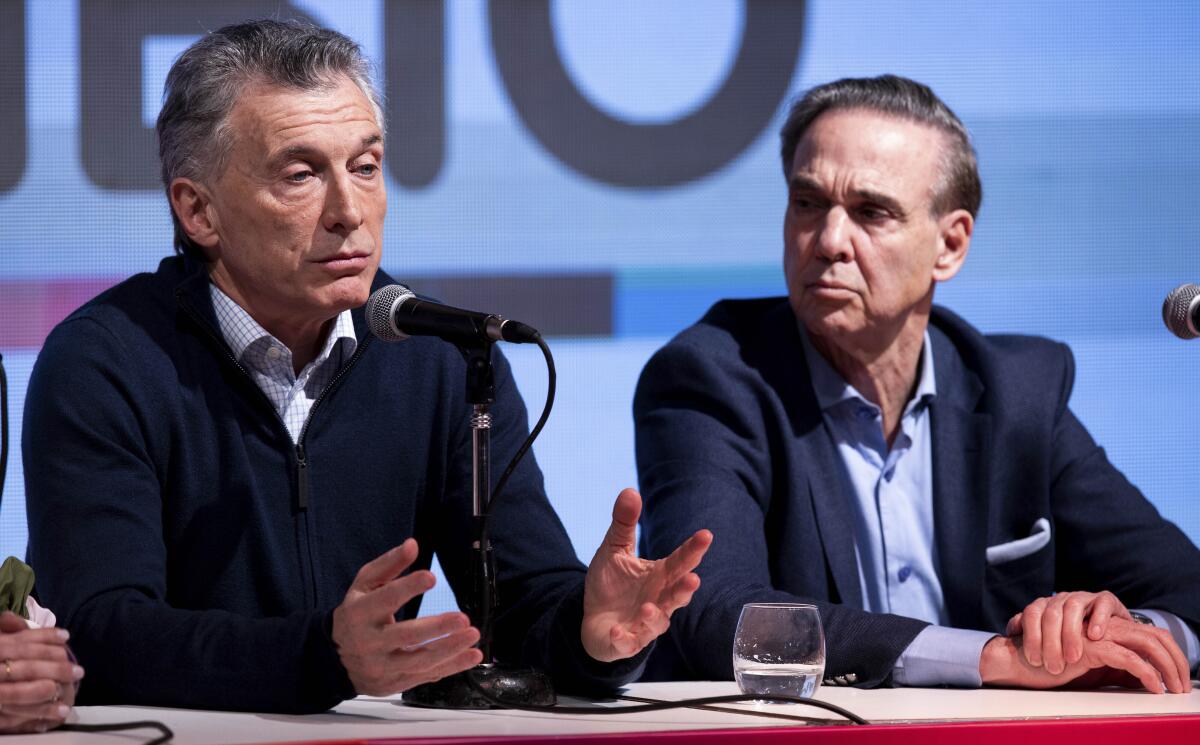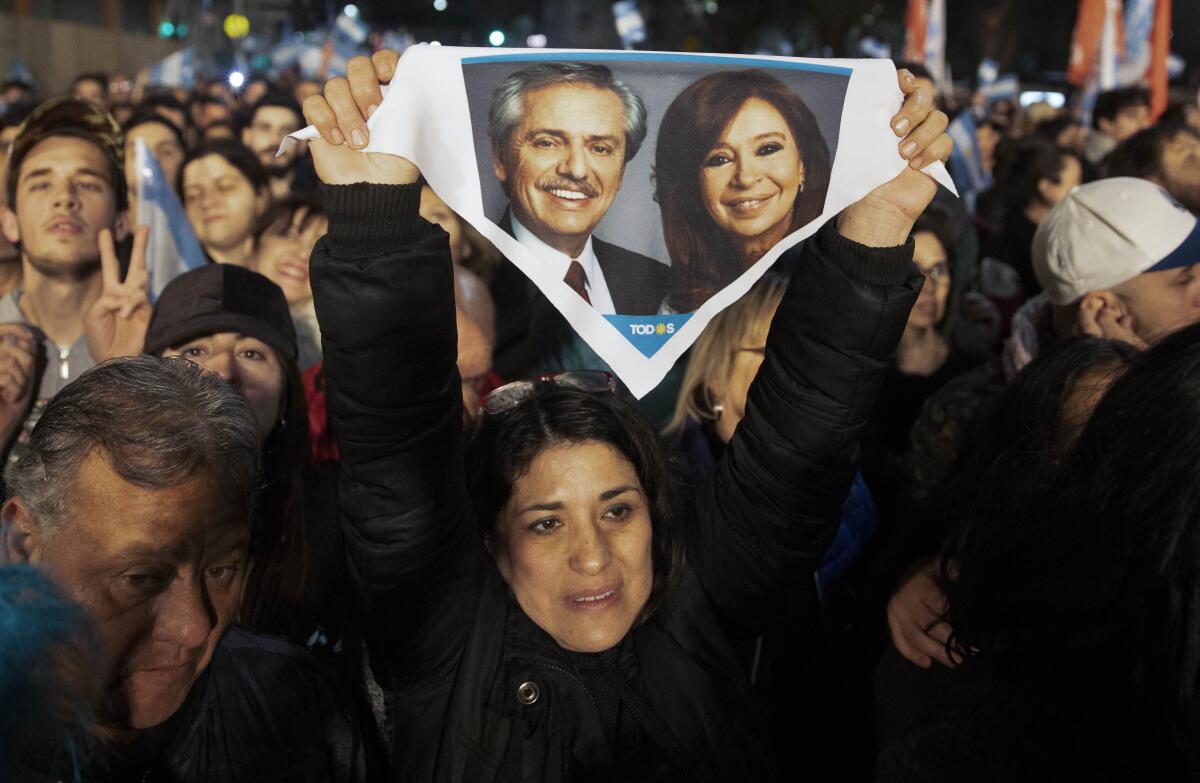In an embrace of the populist left, Argentina voters rebuke their president

- Share via
BUENOS AIRES — Argentina stocks sank, the national currency collapsed and interest rates increased Monday after center-right President Mauricio Macri was crushed in a primary vote that was dominated by a populist ticket that included his predecessor.
The result strongly suggested that in the October general election Cristina Fernandez de Kirchner would be returned to power, this time as vice president to one of her longtime political allies, Alberto Fernandez.
Their slate won 48% of the vote in what experts described as a stinging repudiation of the austere economic programs put in place by Macri, whose ticket finished in second place with 32%.
“The size of the loss speaks to the depth of disgust for Macri’s policies and the dissatisfaction over the direction of the country,” said Carlos Fara, who heads a political consulting firm in Buenos Aires. He called the result a “vote of punishment.”

Macri took office in 2015 promising to reignite a stagnant economy, promote job growth and end Kirchner’s chummy relations with like-minded socialist leaders across Latin America.
But Argentina’s financial situation only worsened over the last two years as a recession struck, businesses closed and about 250,000 jobs evaporated. Meanwhile rampant inflation — averaging 55% in 2019 — outpaced increases in wages and pensions.
The markets continued to support Macri. Their crash Monday reflected investor fears of a takeover by populists who would impose generous but fiscally irresponsible social spending programs.
The main Argentine stock index fell 12%, the peso’s value against the dollar slid by 26% and short-term interest rates, which had risen recently in anticipation of a Macri defeat, jumped to a 74% annual rate from 64% on Friday.
Apart from providing a preview of the general election, Sunday’s primary whittled down the presidential race to the six tickets that garnered at least 1.5% of the vote. If no candidate gets more than 45% of the vote in the election scheduled for Oct. 27, the top two finishers will face each other in a Nov. 24 runoff.
Macri, whose approval rating has sunk to below 35% in recent polls, was not expected to win the primary. But the margin of defeat came as a shock to many.

Interviews with a dozen voters leaving polls in and around Buenos Aires gave hints of the desperation many people feel over the state of the economy, which entered a recession earlier this year.
“We voted for Cristina because we’re much worse off than we were four years ago,” said Fabio Croce, 26, a cook in the lower class Dock Sud suburb of the capital. “The cost of living is going up every week and we don’t make enough to get to the end of the month. We have friends who are selling their clothes to make ends meet.”
In the affluent Almagro barrio, dissatisfaction with Macri seemed nearly as prevalent.
“Who did I vote for? I’m a retiree. That’s all I should have to tell you,” said Miguel Fontenla after voting for the Fernandez-Kirchner ticket at a local high school. “Pensions have risen a little but the cost of living has risen by a lot. We can’t tolerate any more of this. Everyone we know is having problems.”
Adrian Foresi, 54, who owns a plumbing supply business, explained his vote this way: “I voted for Cristina because she will put the country back on its feet. There was less unemployment when she was in power and she helped people pay for their studies, to buy houses. Macri is destroying industry with all his taxes. Argentina has lost its productive capacity.”
Though Fernandez, a 60-year-old former Cabinet chief, is the presidential candidate, many voters interviewed identified Kirchner, 66, as the real headliner. She was president from 2007 to 2015, succeeding her late husband, Nestor, who held office from 2003 to 2007.
During their administrations, the husband-and-wife team won followers by expanding the country’s social programs, generously raising pensions, and doubling the government payroll to 4 million employees between 2003 and 2015, according to Juan Luis Bour, an economist with the FIEL think tank in Buenos Aires.
But many of their social programs proved unaffordable. Starting in 2013, a sharp decline in commodity prices helped create a tsunami of budgetary red ink when Macri took over.
Jorge Giacobbe, a political analyst in Buenos Aires, gave Macri high marks for building new highways and an improved rail system, and for defending a free press and independent judiciary. He added that Macri also has been less adversarial toward the press and supports a more independent judiciary than did Kirchner.
But in the end, “people vote their pocketbooks,” he said.
Deepening economic woes over the last two years are due in part to a drought that caused grain yields to fall last year by 30% from 2017 levels. Moreover, changing global economic conditions reduced the flow of investment to emerging economies such as Argentina.
Worsening conditions forced Macri to seek a $56-billion bail-out package last year from the International Monetary Fund, the largest such loan in IMF history. But conditions of the loan included drastic spending cuts that only alienated more voters.
Kraul is a special correspondent. Special correspondent Andres D’Alessandro contributed to this report.
More to Read
Sign up for Essential California
The most important California stories and recommendations in your inbox every morning.
You may occasionally receive promotional content from the Los Angeles Times.













